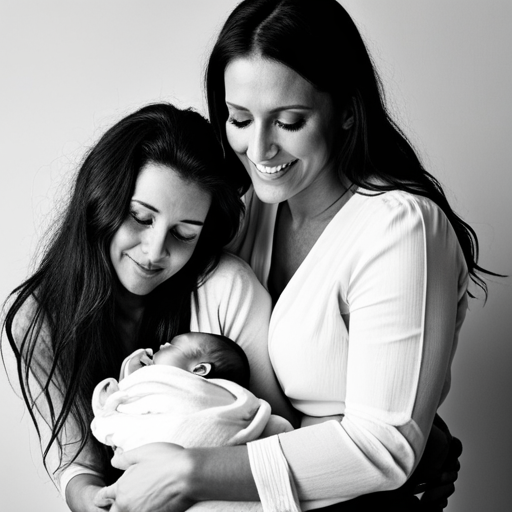"Cherishing Little Steps - A Haven for Baby and Family Journeys"
First-Time Mom Postpartum Tips
Congratulations on becoming a first-time mom!
Did you know that around 60-80% of new mothers experience postpartum blues? It’s completely normal to feel overwhelmed and unsure during this time.
That’s why we’re here to help you navigate through the postpartum period with our practical tips and advice.
As a new mom, it’s important to prioritize self-care and establish a support system. Taking care of your physical and mental well-being is crucial in ensuring a smooth transition into motherhood.
From managing sleep deprivation to finding time for yourself and bonding with your baby, we’ve got you covered.
So, sit back, relax, and let us guide you on your journey to becoming the best version of yourself as a first-time mom.
Prioritize Self-Care

To ensure your well-being during the postpartum period, it’s crucial that you prioritize your own self-care. As a first-time mom, it’s easy to put all your focus and energy on your newborn baby, but remember that taking care of yourself is just as important. Self-care at home can include simple activities like taking a warm bath, reading a book, or practicing deep breathing exercises. These small moments of relaxation can help you recharge and feel more centered amidst the demands of motherhood.
Additionally, self-care while working can be a challenge, but it’s not impossible. If you’re returning to work after having a baby, be sure to communicate your needs and limitations to your employer. It’s important to establish boundaries and create a schedule that allows for breaks and rest. Take advantage of your lunch break by going for a walk or finding a quiet space to meditate. Remember, self-care isn’t selfish but necessary for your overall well-being.
Incorporating self-care into your daily routine won’t only benefit you but also your baby. By taking care of yourself, you’ll have more energy and patience to care for your little one. Make self-care a priority and don’t be afraid to ask for help when needed. You deserve to be taken care of too.
Establish a Support System

You can start building a support system by reaching out to friends and family members who can provide assistance and emotional support during the postpartum period. Having a strong support system is crucial as it can help alleviate some of the challenges and stress that come with being a first-time mom.
One option to consider is finding a doula, a trained professional who can provide physical, emotional, and informational support throughout your pregnancy, birth, and postpartum journey. A doula can offer guidance, help with breastfeeding, and provide reassurance during this new phase of your life.
Another valuable resource is joining a new mom support group. These groups offer a safe space to share experiences, ask questions, and receive support from other moms who are going through similar experiences. Being able to connect with others who understand what you’re going through can be incredibly comforting and empowering.
In addition to friends, family, doulas, and support groups, don’t hesitate to lean on your partner for support. Communicate your needs and concerns openly, and consider exploring parenting classes together to strengthen your bond and prepare for the challenges ahead.
Ease Into Exercise

Start with gentle exercises to gradually reintroduce physical activity into your routine after giving birth. Your body has gone through significant changes during pregnancy and childbirth, so it’s important to ease into postpartum exercise routines to avoid any potential risks or injuries. Here are three tips to help you navigate postpartum fitness challenges:
-
Listen to your body: Pay attention to how you feel during and after exercise. If something doesn’t feel right or causes pain, take a step back and modify or stop the activity. Your body is still healing, so it’s crucial to prioritize your well-being.
-
Start with low-impact exercises: Walking, swimming, and gentle stretching are excellent choices to begin your postpartum fitness journey. These activities help improve circulation, increase energy levels, and promote overall well-being without putting excessive strain on your body.
-
Engage your core: Strengthening your core muscles is essential after giving birth. Start with gentle pelvic floor exercises, also known as Kegels, to help improve bladder control and support your pelvic organs. Gradually progress to abdominal exercises like gentle crunches or planks, focusing on proper technique and breathing.
Nourish Your Body

After easing into exercise, it’s important to focus on nourishing your body during the postpartum period. Postpartum nutrition plays a crucial role in replenishing your energy levels and supporting your overall well-being. Your body has undergone significant changes during pregnancy and childbirth, and now it needs proper nourishment to heal and recover.
A balanced post baby diet is essential for providing your body with the nutrients it needs. Include plenty of fruits, vegetables, whole grains, lean proteins, and healthy fats in your meals. These foods are rich in vitamins, minerals, and antioxidants that can help boost your immune system and aid in healing. Additionally, staying hydrated is crucial for breastfeeding and overall health, so make sure to drink plenty of water throughout the day.
It’s also important to listen to your body and eat when you’re hungry. Your energy needs may be higher during this time, especially if you’re breastfeeding. Snacking on nutritious foods like nuts, seeds, yogurt, and fruits can help keep your energy levels stable and provide essential nutrients.
Remember, nourishing your body isn’t just about what you eat, but also how you eat. Take the time to eat mindfully, savoring each bite and paying attention to your body’s hunger and fullness cues. This can help you maintain a healthy relationship with food and promote better digestion.
Incorporating postpartum nutrition into your daily routine won’t only support your recovery but also contribute to your overall well-being as a new mom. Prioritize nourishing yourself, and you’ll be better equipped to care for your little one.
Manage Sleep Deprivation

Once you have nourished your body with the right nutrients, it’s important to address the challenge of managing sleep deprivation as a first-time mom. Adjusting to your baby’s sleep schedule can be tough, but with the right coping strategies, you can navigate this phase with more ease and grace.
Here are three helpful tips to manage sleep deprivation:
-
Establish a sleep schedule: Creating a consistent sleep routine for both you and your baby can help regulate your sleep patterns. Try to go to bed and wake up at the same time every day, even if it means taking short naps throughout the day. This will help your body adjust and maximize the sleep you do get.
-
Take turns with your partner: If you have a partner, take turns with nighttime feedings and diaper changes. This way, both of you can get some uninterrupted sleep. Communicate openly with each other about your needs and find a schedule that works for both of you.
-
Seek support from others: Don’t hesitate to ask for help from friends and family. They can lend a hand during the day, allowing you to rest and recharge. Additionally, joining a new mom support group can provide you with a network of understanding individuals who can offer advice and encouragement.
Embrace Emotional Changes

To effectively navigate the postpartum period as a first-time mom, it is essential to embrace the emotional changes that come with adjusting to your new role. Becoming a mother is a beautiful and transformative experience, but it can also bring about a range of emotions that may feel overwhelming at times. Coping with anxiety and managing mood swings are common challenges during this period, but with the right mindset and support, you can navigate through them.
It is important to remember that experiencing a wide range of emotions is perfectly normal and part of the postpartum journey. Your body has gone through significant changes and your hormones are adjusting to a new equilibrium. Some days you may feel incredibly joyful and connected to your baby, while other days you may feel more anxious or tearful.
To help you cope with anxiety and manage mood swings, it is crucial to prioritize self-care. Take time for yourself, even if it’s just a few minutes each day. Engage in activities that bring you joy and help you relax, such as taking a warm bath, going for a walk, or practicing deep breathing exercises. It is also important to reach out for support from your partner, family, and friends. Don’t hesitate to ask for help when you need it.
Below is a table that summarizes some practical tips for embracing emotional changes during the postpartum period:
| Tips for Embracing Emotional Changes |
|---|
| Prioritize self-care |
| Engage in activities that bring joy |
| Reach out for support |
Bonding With Your Baby

To strengthen your bond with your baby, actively engage in meaningful interactions and create special moments together. Bonding with your baby isn’t only an important part of their development but also a beautiful experience for you as a first-time mom. Here are three ways you can enhance your bond with your little one:
-
Babywearing benefits: Consider using a baby carrier or sling to keep your baby close to you throughout the day. This physical closeness promotes a sense of security and comfort for your baby, allowing you to be hands-free while still being connected. Babywearing also stimulates their senses and encourages bonding through constant interaction.
-
Importance of skin to skin contact: Skin to skin contact is a powerful way to bond with your baby. Undress your baby and hold them against your bare chest, allowing their skin to touch yours. This practice not only promotes emotional connection but also has numerous physical benefits, such as regulating their body temperature, stabilizing their heart rate, and facilitating breastfeeding.
-
Create special moments: Take advantage of everyday activities to create special moments with your baby. Sing lullabies or nursery rhymes while rocking them to sleep, read them stories, or simply talk to them throughout the day. These interactions help your baby feel loved, secure, and valued, strengthening your bond with them.
Time Management Tips

To effectively manage your time as a first-time mom, prioritize and establish a daily routine that works for both you and your baby. Time management can feel overwhelming with a newborn, but with a few productivity hacks and scheduling strategies, you can create a sense of order and make the most of your days.
First, consider using a planner or digital calendar to keep track of important appointments, feedings, and naps. This will help you stay organized and ensure that you don’t forget any important tasks. It’s also helpful to break down your day into smaller chunks of time, allowing you to focus on specific activities without feeling overwhelmed.
Another time-saving tip is to prepare meals and snacks in advance. This way, you can easily grab something nutritious to eat when hunger strikes, without spending precious minutes in the kitchen. Additionally, consider outsourcing some household tasks, such as cleaning or grocery shopping, to free up more time for yourself and your baby.
Adjusting to New Roles

As a first-time mom, you’ll need to navigate and adjust to multiple new roles. It can be overwhelming at first, but with time and practice, you’ll find your groove.
Here are some tips to help you adjust to your new roles:
-
Embrace the role of caregiver: Your newborn will rely on you for everything, from feeding and changing diapers to providing comfort and love. Take the time to learn the basics of newborn care, such as proper feeding techniques and soothing techniques. Remember to trust your instincts and reach out for support when needed.
-
Prioritize self-care: Taking care of a newborn can be demanding, but it’s crucial to prioritize self-care. Finding balance is key. Make sure to carve out time for yourself, whether it’s taking a relaxing bath, going for a walk, or simply enjoying a cup of tea. Remember, you can’t pour from an empty cup, so taking care of yourself will ultimately benefit both you and your baby.
-
Adjusting to your new identity: Becoming a mother is a transformative experience that brings a new dimension to your identity. It’s normal to feel a mix of emotions as you adjust to this new role. Give yourself permission to feel and process these emotions, and remember that it takes time to fully embrace and settle into your new identity as a mother.
Seeking Professional Help

If you find that adjusting to your new roles as a first-time mom becomes overwhelming or you’re experiencing difficulties, it’s important to seek professional help. Sometimes, the challenges of motherhood can be more than what we expected, and that’s okay. Seeking professional guidance can provide you with the support and tools you need to navigate this new chapter of your life.
When it comes to seeking professional help, mental health support is crucial. Postpartum depression and anxiety are common issues that many new moms face, and these conditions can greatly impact your well-being and ability to care for your baby. A mental health professional can help you identify and manage these feelings, providing you with coping strategies and support.
Additionally, a professional can offer guidance on various aspects of motherhood, such as breastfeeding, sleep training, and managing the demands of a newborn. They can help you establish a routine that works for you and your baby, ensuring that both of you’re getting the care and attention you need.
Frequently Asked Questions
How Can I Manage the Physical Changes That Occur During Postpartum?
You can manage the physical changes that occur during postpartum by taking care of yourself. Focus on self-care, gentle exercises, and a healthy diet. Remember, your body has just gone through a major transformation, and it’s important to give yourself time to adjust and embrace your new body image.
What Are Some Strategies for Effectively Managing Stress as a First-Time Mom?
Managing stress as a first-time mom can be challenging, but remember the saying "take it one step at a time." Prioritize self-care practices like deep breathing, meditation, and asking for help. You deserve support during this journey.
Are There Any Specific Foods or Supplements That Can Help With Postpartum Recovery?
To help with postpartum recovery, it’s important to focus on postpartum nutrition. Eating a well-balanced diet that includes plenty of fruits, vegetables, lean proteins, and whole grains can provide the necessary nutrients. Some women may benefit from postpartum supplements, but it’s best to consult with your healthcare provider for personalized recommendations.
How Can I Navigate the Challenges of Breastfeeding as a First-Time Mom?
Breastfeeding challenges can be tough for first-time moms. Remember to seek support, whether it’s from a lactation consultant, online forums, or fellow moms. Take care of yourself too, with rest, hydration, and healthy snacks.
What Are Some Strategies for Maintaining a Healthy Relationship With My Partner During the Postpartum Period?
Maintaining a healthy relationship with your partner during the postpartum period can be challenging, but it’s crucial. Show empathy, communicate openly, and find time for each other. Your partner’s emotional support will help navigate this new chapter together.
Conclusion
In conclusion, as a first-time mom, it’s essential to prioritize self-care, establish a support system, and ease into exercise to navigate the postpartum period successfully.
Remember, taking care of yourself is crucial for your overall well-being and ability to care for your baby.
Interestingly, studies show that having a strong support system reduces the risk of postpartum depression by 50%.
So, reach out to loved ones, seek professional help if needed, and remember that you’re not alone in this journey.


